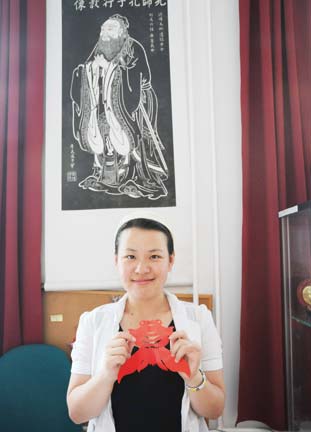 |
|
Li Yuan finishes a paper-cutting work to prepare for a Chinese class at the Confucius Institute at Eotvos Lorand University in Budapest, Hungary. Xu Lin / China Daily |
"My life in the institute is like a cup of tea - bitter at first but with a soothing aftertaste," says Li, armed with an English postgraduate certificate from Anhui University.
In 2004, the Chinese government established Confucius Institutes to promote Chinese language and culture abroad. These institutes are nonprofit organizations attached to foreign academic institutions such as universities.
To meet the shortage of Chinese teachers overseas, the Confucius Institute headquarters, or Hanban(Chinese National Office for Teaching Chinese as a Foreign Language), recruits volunteers among teachers, postgraduate students and fresh graduates. As of end-2010, Hanban has sent more than 10,000 volunteers to 89 countries in the world.
In 2010, Li flew to Budapest as a Confucius Institute volunteer. The 26-year-old teaches Chinese language to two classes of adult learners and conducts another class for the employees of a Chinese company. She earns $800 a month from 14 hours of teaching per week. The institute offers free accommodation. Li also organizes various Chinese cultural activities with other volunteers, such as tea ceremonies.
"The Hungarians are very hospitable. I didn't expect them to be so interested in our language and culture," she says.
According to her, some kids learn Chinese because they like kung fu, while adults learn Chinese with the hope of landing a better job.
Many of her students are curious about China. Some know even more about China than her. They ask her all sorts of questions, forcing her to do research and indirectly, she learns more about her motherland.
"Whenever I see my students making progress or if they travel to China for work or on tours, I feel that I've accomplished more than the job of a tutor. I treat them as my good friends and they trust me very much," she says.
Before going to Budapest, she was trained at the Confucius Institute in Beijing on Chinese culture and teaching. There, she learned skills like paper cutting and calligraphy. She had no idea which country she would be sent to until the training ended.
"I didn't expect to be here as I knew little about Hungary," she says. But she was pleasantly surprised.
"Budapest is so pretty! I didn't have any culture shock. I've been learning the language and making friends with locals," she says. "Teaching in the Hungarian language rather than in English connects us, and is more efficient, especially to those whose English is poor," she says.
Li says it's important to respect the students' traditions when communicating with them and their families. For example, she learnt to bring some flowers or a bottle of wine as a gift when visiting the Hungarians.
She often gets invited to her students' homes. Once, she went to a young student's house and was surprised to find a Chinese paper-cut dragon and a jigsaw puzzle about China in his room. He also watches Chinese movies and listens to Chinese music.
Hanban is grateful to volunteers like Li. "These young volunteers bear the hardships to work away from home, with a low income. Thanks to their devotion, the institute has achieved great success in recent years," says institute director Qi Baihua.
Like other volunteers, Li gets to visit her family once a year for a month. She often video chats with her parents but the time difference makes it a challenge sometimes.
Li has not decided whether to continue her contract in October. "I miss my family very much but I love my interesting job. I've gained a strong sense of accomplishment," she says. "I've not only broadened my horizons, but I've learnt interpersonal and cooking skills. Life is at a slower pace here. I may have to readjust myself when I go back to China," Li adds.
|
|
|
|
|
|
|
|
